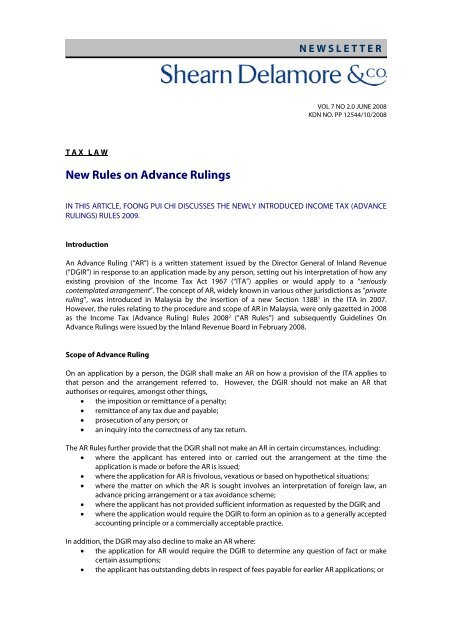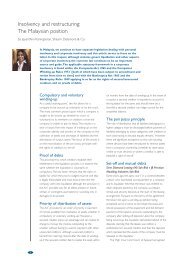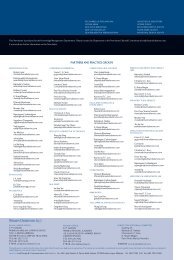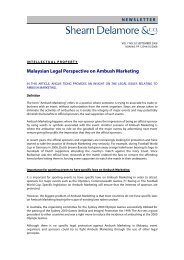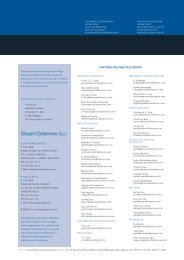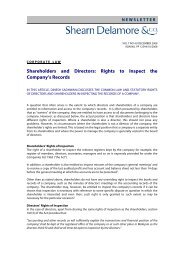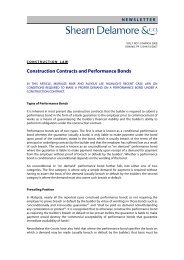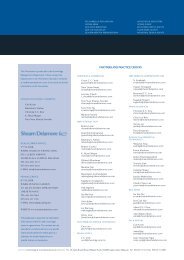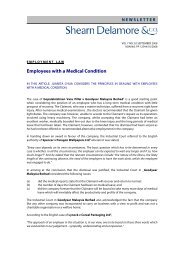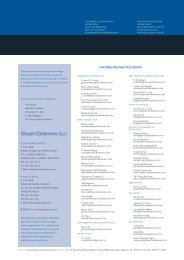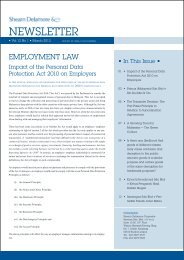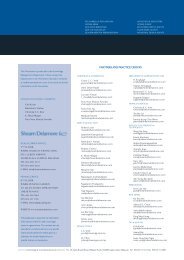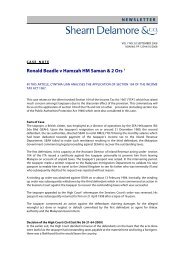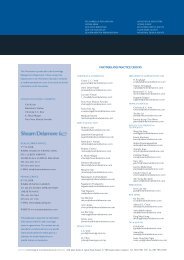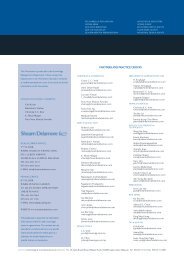New Rules on Advance Rulings - Shearn Delamore
New Rules on Advance Rulings - Shearn Delamore
New Rules on Advance Rulings - Shearn Delamore
Create successful ePaper yourself
Turn your PDF publications into a flip-book with our unique Google optimized e-Paper software.
N E W S L E T T E RVOL 7 NO 2.0 JUNE 2008KDN NO. PP 12544/10/2008T A X L A W<str<strong>on</strong>g>New</str<strong>on</strong>g> <str<strong>on</strong>g>Rules</str<strong>on</strong>g> <strong>on</strong> <strong>Advance</strong> <strong>Rulings</strong>IN THIS ARTICLE, FOONG PUI CHI DISCUSSES THE NEWLY INTRODUCED INCOME TAX (ADVANCERULINGS) RULES 2009.Introducti<strong>on</strong>An <strong>Advance</strong> Ruling (“AR”) is a written statement issued by the Director General of Inland Revenue(“DGIR”) in resp<strong>on</strong>se to an applicati<strong>on</strong> made by any pers<strong>on</strong>, setting out his interpretati<strong>on</strong> of how anyexisting provisi<strong>on</strong> of the Income Tax Act 1967 (“ITA”) applies or would apply to a “seriouslyc<strong>on</strong>templated arrangement”. The c<strong>on</strong>cept of AR, widely known in various other jurisdicti<strong>on</strong>s as “privateruling”, was introduced in Malaysia by the inserti<strong>on</strong> of a new Secti<strong>on</strong> 138B 1 in the ITA in 2007.However, the rules relating to the procedure and scope of AR in Malaysia, were <strong>on</strong>ly gazetted in 2008as the Income Tax (<strong>Advance</strong> Ruling) <str<strong>on</strong>g>Rules</str<strong>on</strong>g> 2008 2 (“AR <str<strong>on</strong>g>Rules</str<strong>on</strong>g>”) and subsequently Guidelines On<strong>Advance</strong> <strong>Rulings</strong> were issued by the Inland Revenue Board in February 2008.Scope of <strong>Advance</strong> RulingOn an applicati<strong>on</strong> by a pers<strong>on</strong>, the DGIR shall make an AR <strong>on</strong> how a provisi<strong>on</strong> of the ITA applies tothat pers<strong>on</strong> and the arrangement referred to. However, the DGIR should not make an AR thatauthorises or requires, am<strong>on</strong>gst other things,• the impositi<strong>on</strong> or remittance of a penalty;• remittance of any tax due and payable;• prosecuti<strong>on</strong> of any pers<strong>on</strong>; or• an inquiry into the correctness of any tax return.The AR <str<strong>on</strong>g>Rules</str<strong>on</strong>g> further provide that the DGIR shall not make an AR in certain circumstances, including:• where the applicant has entered into or carried out the arrangement at the time theapplicati<strong>on</strong> is made or before the AR is issued;• where the applicati<strong>on</strong> for AR is frivolous, vexatious or based <strong>on</strong> hypothetical situati<strong>on</strong>s;• where the matter <strong>on</strong> which the AR is sought involves an interpretati<strong>on</strong> of foreign law, anadvance pricing arrangement or a tax avoidance scheme;• where the applicant has not provided sufficient informati<strong>on</strong> as requested by the DGIR; and• where the applicati<strong>on</strong> would require the DGIR to form an opini<strong>on</strong> as to a generally acceptedaccounting principle or a commercially acceptable practice.In additi<strong>on</strong>, the DGIR may also decline to make an AR where:• the applicati<strong>on</strong> for AR would require the DGIR to determine any questi<strong>on</strong> of fact or makecertain assumpti<strong>on</strong>s;• the applicant has outstanding debts in respect of fees payable for earlier AR applicati<strong>on</strong>s; or
• the matter <strong>on</strong> which the AR is sought is subject to an appeal before the SpecialCommissi<strong>on</strong>ers of Income Tax.Procedure for Applicati<strong>on</strong> of <strong>Advance</strong> RulingAn applicati<strong>on</strong> for AR has to be made in Borang KA [1/2007] and the AR <str<strong>on</strong>g>Rules</str<strong>on</strong>g> do not <strong>on</strong>ly allow apers<strong>on</strong> to apply for an AR in his own right or jointly with others, but also allow an applicati<strong>on</strong> to bemade <strong>on</strong> behalf of a pers<strong>on</strong> who is yet to come into legal existence, such as a company which is yet tobe incorporated.When making the applicati<strong>on</strong>, the applicant may be required to submit, am<strong>on</strong>gst others, thefollowing particulars:• the identity of the applicant;• a complete descripti<strong>on</strong> of all relevant facts and documents relating to the arrangement inrespect of which the AR is sought;• a statement identifying the relevant ITA provisi<strong>on</strong>s in respect of which the AR is sought;• the propositi<strong>on</strong> of law (if any) which is relevant to the issues raised in the applicati<strong>on</strong>;• a statement whether a previous applicati<strong>on</strong> has been made <strong>on</strong> the same or any similararrangement by the applicant and the result of any such applicati<strong>on</strong>; and• any other particulars as may be required by the DGIR.Where necessary, the DGIR may also request for further informati<strong>on</strong> from the applicant or makecertain assumpti<strong>on</strong>s if such informati<strong>on</strong> could not be obtained.Fees for <strong>Advance</strong> RulingEvery AR applicati<strong>on</strong> must be accompanied with a n<strong>on</strong>-refundable applicati<strong>on</strong> fee of RM500. Overand above that, a further fee of RM150 per hour (or part thereof) bey<strong>on</strong>d the first 4 hours would becharged for the time spent by the DGIR to c<strong>on</strong>sider the applicati<strong>on</strong> and the applicant would also berequired to reimburse the DGIR for any fees incurred by the DGIR for obtaining external advice as wellas any other costs and reas<strong>on</strong>able disbursements incurred by the DGIR in relati<strong>on</strong> to the AR.Finality & Binding Nature of <strong>Advance</strong> RulingWhen an AR has been issued to the applicant, it shall be final and no appeal shall be lodged against it.This means that it shall be binding up<strong>on</strong> the DGIR subject to any qualificati<strong>on</strong>s specified in the AR andalso up<strong>on</strong> the applicant in respect of the particular arrangement and time period as specified in theruling, unless:• the arrangement carried out by the applicant is materially different from the arrangementstated in the AR;• there was a material omissi<strong>on</strong> or misrepresentati<strong>on</strong> in, or in c<strong>on</strong>necti<strong>on</strong> with, the applicati<strong>on</strong>for the AR;• the assumpti<strong>on</strong> made by the DGIR about a future event or another material eventsubsequently proves to be incorrect; or• the c<strong>on</strong>diti<strong>on</strong>s stipulated in the AR are not satisfied by the applicant 3 .With the issuance of an AR, the DGIR will apply the AR to the pers<strong>on</strong> and arrangement in accordancewith the AR, provided the pers<strong>on</strong> to whom the ruling applies also applies the ITA provisi<strong>on</strong> in themanner stated in the ruling 4 . However, an AR shall cease to apply if the ITA provisi<strong>on</strong> in respect ofwhich the AR was sought has been repealed or amended and the DGIR may also, at any time,withdraw an AR 5 , with the withdrawal to take effect as specified in the notice of withdrawal but notearlier than the date such notice is reas<strong>on</strong>ably expected to be received.<str<strong>on</strong>g>New</str<strong>on</strong>g> <str<strong>on</strong>g>Rules</str<strong>on</strong>g> <strong>on</strong> <strong>Advance</strong> <strong>Rulings</strong> 2
C<strong>on</strong>clusi<strong>on</strong>Though it may be too early to assess the viability of the Malaysian AR system, a potential shortcomingwhen compared with the other AR systems is the lack of an avenue for appeal (where no assessmenthas been or will be raised) in the event the applicant disagrees with the interpretati<strong>on</strong> of the DGIR.Unlike the Australian system, the AR <str<strong>on</strong>g>Rules</str<strong>on</strong>g> also fails to address situati<strong>on</strong>s where an AR is inc<strong>on</strong>sistentwith a Public Ruling 6 or where the law turns out to be more favourable to the applicant.As such, whilst the AR system is aimed to promote tax certainty and compliance and to minimisedisputes between the DGIR and taxpayers, it is left to be seen whether such objectives could beachieved in practice.FOONG PUI CHITAX & REVENUE PRACTICE GROUPFor further informati<strong>on</strong> <strong>on</strong> c<strong>on</strong>cerning the Income Tax (<strong>Advance</strong> Ruling) <str<strong>on</strong>g>Rules</str<strong>on</strong>g> 2009, pleasec<strong>on</strong>tactGoh Ka Imkgoh@shearndelamore.comAnand Rajanand@shearndelamore.com1Secti<strong>on</strong> 138B of the ITA came into operati<strong>on</strong> <strong>on</strong> 1 January 2007.2The Income Tax (<strong>Advance</strong> Ruling) <str<strong>on</strong>g>Rules</str<strong>on</strong>g> 2008 [P.U. (A) 41/2008] shall be deemed to come into operati<strong>on</strong> <strong>on</strong> 1 January 2007.3See Secti<strong>on</strong> 138B(6) of the ITA.4See Secti<strong>on</strong> 138B(4) of the ITA.5See Secti<strong>on</strong> 138B(3) of the ITA.6A Public Ruling is issued for the purpose of providing guidance to the public and officers of the Inland Revenue Board ofMalaysia, setting out the interpretati<strong>on</strong> of the DGIR as to how any existing provisi<strong>on</strong> of the ITA applies or would apply to anypers<strong>on</strong> or class of pers<strong>on</strong>s, or any type of arrangement. See Secti<strong>on</strong> 138A of the ITA.<str<strong>on</strong>g>New</str<strong>on</strong>g> <str<strong>on</strong>g>Rules</str<strong>on</strong>g> <strong>on</strong> <strong>Advance</strong> <strong>Rulings</strong> 3


